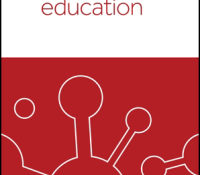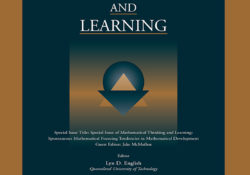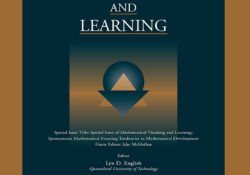tandfonline.com har udgivet en rapport under søgningen „Teacher Education Mathematics‟: Abstract Abstract Curriculum development has always been dealt as one of the most important areas of language learning and teaching by educational institutions. Null curriculum has been viewed as one of the significant kinds of curriculum types which is important due to its absence, being left out or overlooked but should not be disregarded. For this reason, a 48-item questionnaire for null curriculum in ELT with a special focus on twenty-first century skills was developed and validated by the application of the Rasch model. The Rasch model was employed to decide whether the scores of an instrument are purposive, meaningful and significant. Rasch analysis using Winsteps software version 3.73 was used to determine the dimensionality, use of response category, sample… Continue Reading →
Like this:
Like Loading...
eric.ed.gov har udgivet: This hearing explores the accountability rule that the Department of Education proposed on May 31st. This goes to the heart of the law to fix No Child Left Behind. The Federal Government decided that math and reading test results would determine whether schools and teachers were succeeding or failing. The two main concerns of this hearing are: (1) Does the proposed accountability rule actually get the Federal Government back in the business of setting State academic standards?; and (2) Does the proposed accountability rule get the Federal Government back in the business of deciding which schools are succeeding or failing? This hearing transcript provides a prepared statement from witness John King, Secretary, U.S. Department of Education. This is followed by additional materials, namely Ensuring Equity in ESSA:… Continue Reading →
Like this:
Like Loading...
eric.ed.gov har udgivet: This report examines the impact of content-intensive Professional Development (PD) on teachers‛ math content knowledge, their instructional practice, and their students‛ achievement. The study’s PD had three components, totaling 93 hours. The core of the PD was „Intel Math,‟ an intensive 80-hour workshop delivered in summer 2013 that focused on deepening teachers‛ knowledge of grades K-8 mathematics. Two additional PD components totaling 13 hours were delivered during the 2013-14 school year: the „Mathematics Learning Community,‟ a series of five 2-hour collaborative meetings focused on analyzing student work; and „Video Feedback Cycles,‟ a series of three one-on-one coaching sessions where teachers‛ lessons were observed and critiqued. The purpose of these two components was to reinforce the math content in Intel Math and help teachers apply the content to… Continue Reading →
Like this:
Like Loading...
eric.ed.gov har udgivet: Improving math achievement among U.S. students remains a high priority as results from recent math assessments continue to show room for improvement. For example, 60 percent of fourth-graders scored below the proficient level on the 2015 National Assessment of Educational Progress. On the most recent Program for International Student Assessment’s math problem-solving test, U.S. 15-year-olds outperformed students in only 6 of the 34 participating countries. In an era of increasingly rigorous state standards, teachers at all grade levels face heightened expectations to deepen their students‛ understanding of mathematical concepts. Teachers may thus benefit from professional development (PD) that deepens their own conceptual understanding of math. Elementary school teachers may especially benefit from content-focused PD because they are less likely to formally study math in college than secondary… Continue Reading →
Like this:
Like Loading...
eric.ed.gov har udgivet: Recent results from national and international assessments continue to show a need for improvement in math achievement among U.S. students. For example, 60 per-cent of grade 4 students scored below the proficient level on the 2015 National Assessment of Educational Progress. In an era of increasingly rigorous state standards, teachers at all grade levels face heightened expectations to deepen their students‛ understanding of math concepts. Teachers may benefit from professional development (PD) that strengthens their own conceptual understanding of math, particularly elementary school teachers who are less likely to formally study math in college than secondary teachers are. To date, there is limited convincing evidence on the effectiveness of intensive, content-focused PD, a gap this study intended to address. This study examined the implementation and impact of… Continue Reading →
Like this:
Like Loading...
tandfonline.com har udgivet en rapport under søgningen „Teacher Education Mathematics‟: ABSTRACT ABSTRACT Children’s own spontaneous mathematical activities are crucial for their mathematical development. Mathematical thinking and learning does not only occur in explicitly mathematical situations, such as the classroom. Those children with higher tendencies to recognize and use mathematical aspects of their everyday surroundings, both within the classroom and without, appear to have an advantage in learning formal mathematical skills and knowledge. In this introduction to the special issue, we provide an overview of the existing literature on spontaneous mathematical focusing tendencies. We then provide a brief overview of the contributions to the special issue. Link til kilde
Like this:
Like Loading...
tandfonline.com har udgivet en rapport under søgningen „Teacher Education Mathematics‟: ABSTRACT ABSTRACT In this study we investigated the effects of two naturalistic 2- to 4-year-old children’s intervention programs aimed at promoting children’s Spontaneous Focusing On Numerosity (SFON) and early numerical skills. The study consisted of a quasi-experimental, pretest-posttest design with a delayed posttest and an active control group participating in the Let’s Read and Talk program. All conditions had 6 weeks of intensive training followed by a 4-month rehearsal phase, when intervention activities were integrated into normal day care. The results of both numerical interventions in the whole group level show positive, small- to medium-sized long-term effects on cardinality-related skills from pretest to delayed posttest. The SFON tendency increased more from pretest to posttest in both studies but the group differences… Continue Reading →
Like this:
Like Loading...


